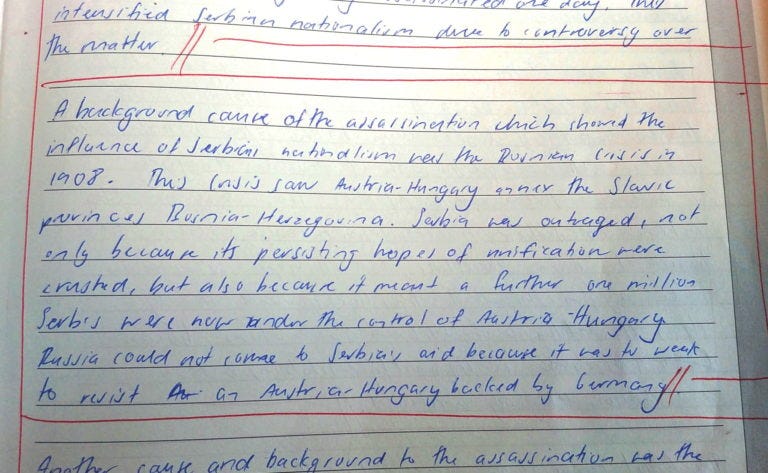3 simple rules to massively improve your teen’s writing skills
Getting your teen's writing skills on track can start simply and easily
Hi there,
If your teen is struggling with subjects that are language-heavy then they’re probably not a fan of writing essays, am I right?
This is a BIG stress point for a LOT of students. So many teens are completely daunted by the prospect of writing an essay. They don’t know where to start. They don’t know how to communicate clearly.
I come with good news though.
There are a few simple but essential principles of writing that are often overlooked, but there is no reason why your teen can’t start abiding by these principes right away.
Now, let’s be real. Let’s not expect your teen to start churning out best-sellers right away, but I honestly believe that — with the right tools — any teen is capable of learning to produce a well-structured high school essay worthy of a decent grade.
To that end here are 3 simple rules to help your teen, at the very least, write essays that are structurally sound and easy to follow.
Rule 1: 1 point per sentence
This might sound ridiculously simple, but teens seem to get it in their head that shoving as many points as possible into one sentence makes them sound smart, when actually the opposite is true.
Simplicity is the key when it comes to clarity. One point per sentence is a good rule to follow. As a guideline, your teen’s essay sentences probably shouldn’t have more than two commas in them. More than this and the sentence is likely to become convoluted and confusing.
Help your teen keep their sentences short and to the point, and immediately their writing should be clearer.
Rule 2: Grammar
I confess that I have become a bit of a grammar dork. I’m that annoying friend that points out you’ve said ‘less’ rather than ‘fewer’.
But grammar does matter. Poor grammar takes the shine off what could otherwise be a perfectly agreeable sentence. It’s distracting.
The most common grammatical errors I see are:
using incorrect prepositions (here is an excellent overview of prepositions from Walden University - thanks guys)
misusing apostrophe words like you’re vs your and it’s vs its
then vs than
mix and matching different time tenses (best to be consistent)
overusing or underusing commars
I’m not expecting your teen’s writing to perfect, and more to the point it doesn’t need to be. But an essay full of grammatical errors is more difficult to read, which makes it harder for the examiner to like your essay.
Rule 3: Less is more
Verbose writing is not fun to read. Rather than showing the reader that you are knowledgable, it can come across that you don’t really understand what you’re writing about so you’re going to take five sentences to explain it instead of two.
Being able to explain an idea in as few words as possible is one of the hallmarks of good writing. Maybe not always in creative writing where descriptions can be useful and enjoyable to read, but academic writing is much clearer and easier to read when the sentences are simple.
When your teen is reviewing their work (a draft essay, perhaps), you can encourage them to ask themselves — is there a better way to word that sentence? or, is there a way I can make this point using fewer words?
Writing is a big part of my job (including my ‘real’ job), and I still ask myself those questions all the time.
Implementing these three rules and developing better writing habits might take some time, but as you can see, they’re quite tangible and straightforward skills, so there is no reason why your teen isn’t capable of implementing these tips for themselves.
What’s your teen working on at the moment? Are they learning to write essays? How’s it going? Let us know in the comments.
Thanks so much for reading.
Clare



